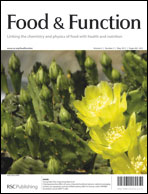Almond protein hydrolysate fraction modulates the expression of proinflammatory cytokines and enzymes in activated macrophages
Abstract
Simulated gastrointestinal treatment of almond proteins with pepsin and pancreatic proteases resulting in 16.6% degree of hydrolysis or 1.33 milliequivalent leucine per g protein yielded a hydrolysate that modulated excessive nitric oxide production in lipopolysaccharide-activated RAW264.7 macrophages. After fractionation, a resulting fraction of molecular size > 5 kDa retained the nitric oxide modulatory effect observed initially in the crude hydrolysate. The high molecular size fraction was found to modulate levels of proinflammatory cytokines, interleukin (IL)-6, IL-1β, and tumour necrosis factor (TNF)-α in the activated cells. Immunoblotting analysis indicated that the hydrolysate fraction decreased the expression levels of inflammatory enzyme indicators, inducible nitric oxide synthase (iNOS) and cyclooxygenase (COX)-2 in the activated cells. RT-PCR analysis showed that treatment of the activated cells with the hydrolysate fraction resulted in the inhibition of relative gene expressions of proinflammatory IL-6, IL-1β, TNF-α, iNOS and COX-2. These results indicate a potential application of almond protein hydrolysates against inflammatory conditions, and will contribute to delineating the possible contributions of proteins to health benefits attributed to almond consumption.


 Please wait while we load your content...
Please wait while we load your content...